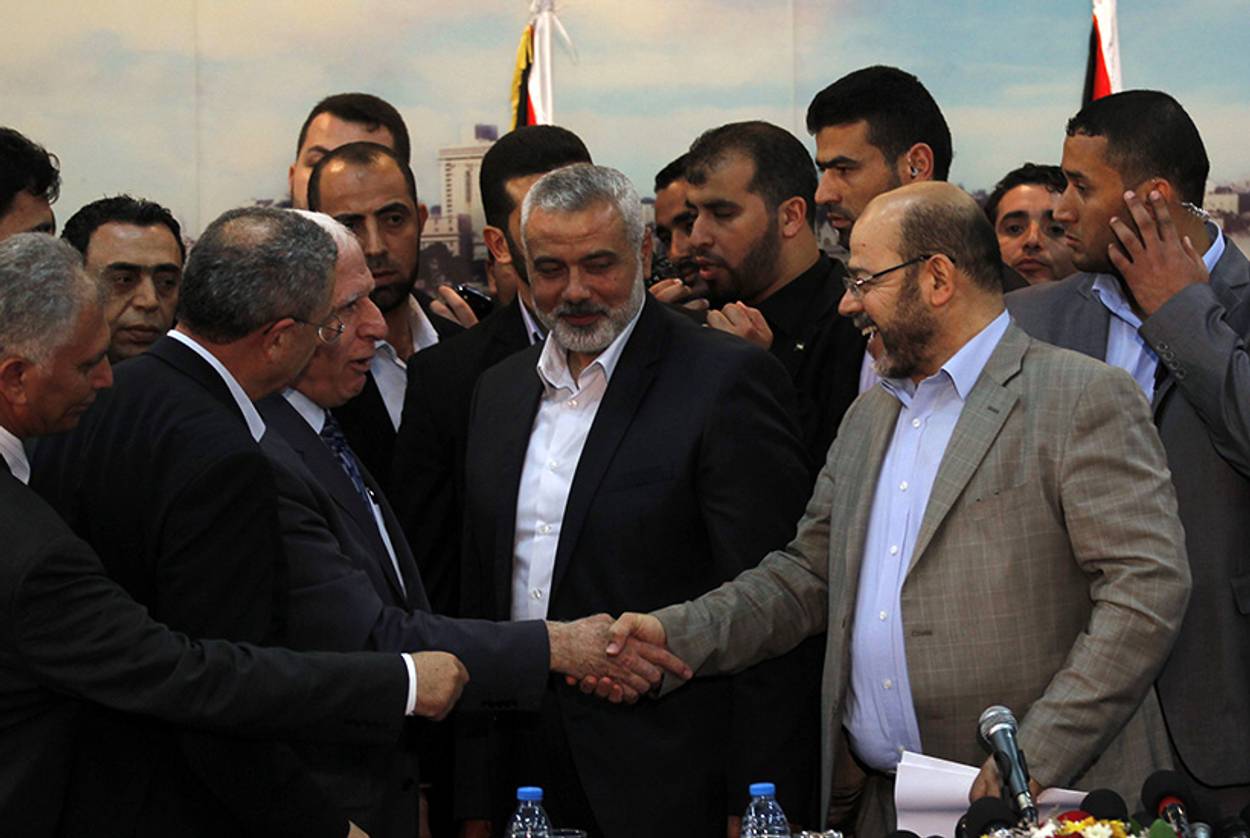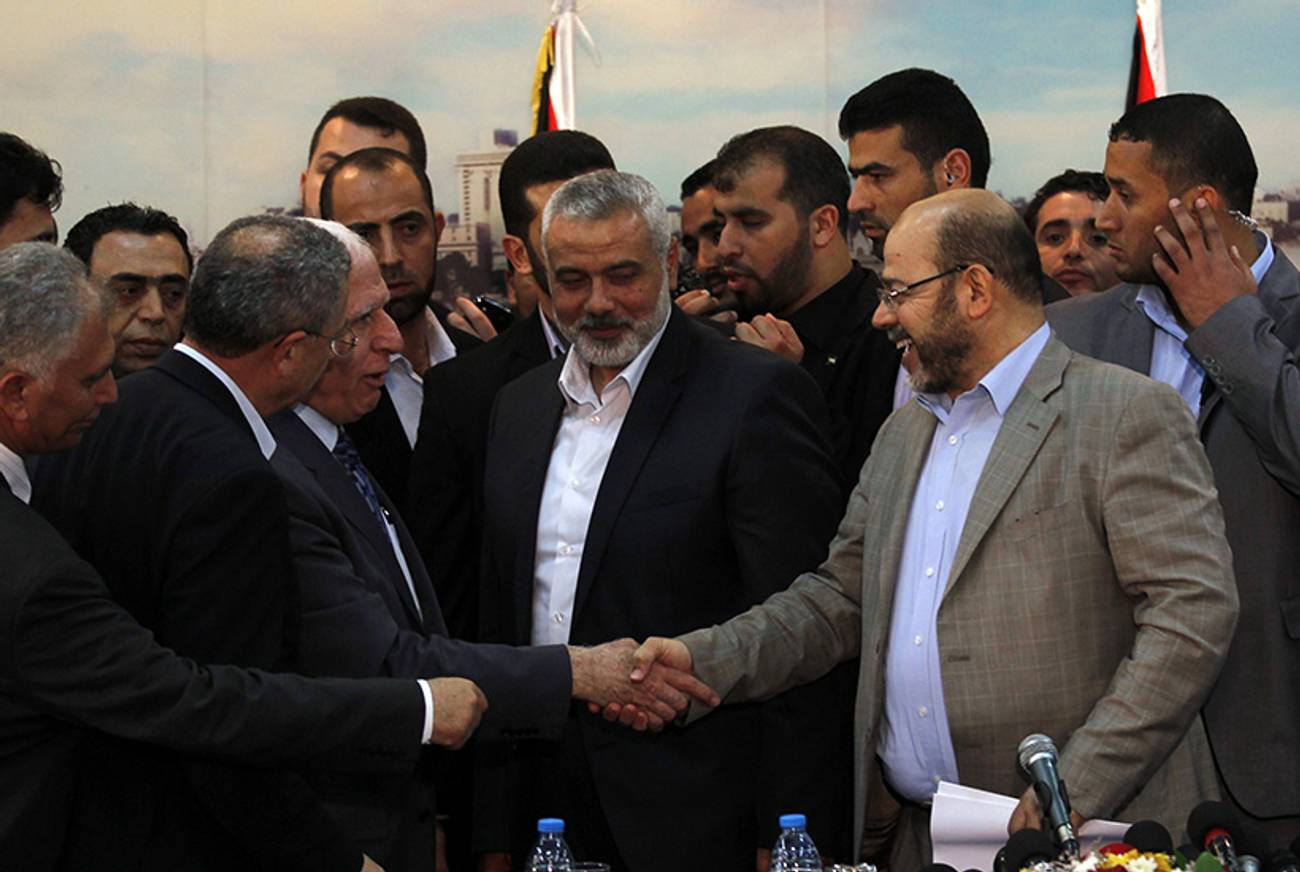In PLO-Hamas Deal, a Moment of Moral Clarity
The Israeli-Palestinian conflict used to be complex. By partnering with terrorists, Mahmoud Abbas just made it very simple.




Last week, I wrote a column calling on the Palestinian Authority to grow up, get serious, and start acting like the responsible, capable, and free state it would have us believe it wishes to become. To the surprise of no one, the column made the usual suspects react in the usual fashion: A slim margin of commenters smothered the critique with snark, while the rest reveled in everything from musings about excrement to inspired meditations on my physical appearance.
One reader, however, seems to have taken my words to heart: Earlier this week, the Rais himself, Palestinian Authority President Mahmoud Abbas, stepped up, stared destiny in the face, and boldly embraced Hamas, ending a seven-year rift between the PLO and the terrorist organization currently in command of the Gaza Strip.
Anyone seriously invested in the Israeli-Palestinian conflict should be grateful to Abbas for providing what this conflict—a century-long thriller in which the plot lines have become impossible to follow—needed most: a moment of clarity. With Israeli Prime Minister Benjamin Netanyahu on one end and Hamas’s Ismail Haniyeh on the other, Abbas emerged as the Third Man, stepping out of the shadows to reveal that he was just the man we’d suspected he was all along, the kind of man who walks away from strenuous peace talks and into the arms of murderers.
I’ve written about Abbas’s choice already. There’s nothing more to say: There’s really only so much one can read into partnering with an organization responsible for the blowing up of 21 young people at a disco, or 15 people at a pizzeria, or 30 people sitting down to celebrate the Passover Seder. So let’s not waste time talking about Abbas’s choice anymore; it’s time to talk about ours.
Living in modern and increasingly complex societies governed by so many intertwining interests and conflicting forces, we’ve come to sanctify complexity, cherish nuance, and believe that our every analysis, our every thought, was best if guided by layer upon layer of context and meaning. But there’s another drive at play, the moral drive, which is far more blunt and far more pressing. And right now, if we’re healthy and mindful human beings with at least a modicum of historical knowledge and a genuine desire to see peace for both Palestinians and Israelis, this moral drive is telling us to shout.
It’s telling us to shout because while both sides of this conflict have seen seasoned combatants drop their arms and attempt reconciliation, there ought to be no room ever around any cabinet’s table for men who packed makeshift bombs tight with nails and screws and bolts to better tear at the flesh of innocent children. It’s telling us to shout because while both sides have their share of outspoken dunces with shameful opinions, no one in their right mind should share power with those whose ignorance and bigotry extend so far as to deny the Holocaust. It’s telling us to shout because while there’s been questionable legislation on both sides of the Green Line over the years, the tolerance of every civilized person should end when confronted with those who dispatch armed forces to oppress their women, who systematically persecute minorities, and who know no other form of conduct but wanton violence. Such men are not complex. They are not nuanced, layered, or worthy of a closer reading. They are evil, and they must be dealt with accordingly lest their benighted vision succeed in afflicting more misery and claiming more lives.
Of course, some of us may find talk of evil anathema to the dictates of sophistication and the edicts of cosmopolitanism. Some may argue, as J Street so disappointingly did this week, that “one makes peace with one’s enemies.” There’s truth to that, but only if one’s enemies are ready to abandon their quest to obliterate a people by launching thousands of rockets into schoolyards, backyards, and living rooms. Hamas has indicated no such readiness. Nor can it: As its very charter indicates, the organization is dedicated to annihilating the state of Israel; “in the face of the Jews’ usurpation of Palestine,” goes one choice bit from its charter, “it is compulsory that the banner of Jihad be raised.” You will read nothing of the banner of Jihad in the statement released by the American Friends of Peace Now, which calls Hamas’s pending inclusion in the Palestinian government “a good idea.”
But as some flounder, others rise to the occasion. Speaking with clarity, courage, and conviction, Rep. Ileana Ros-Lehtinen, R-Fla., who chairs the House Foreign Affairs Panel on the Middle East, called on the Obama administration to do the right thing.
“The Administration must halt aid to the Palestinian Authority and condition any future assistance as leverage to force Abu Mazen [Mahmoud Abbas] to abandon this reconciliation with Hamas and to implement real reforms within the P.A.,” Ros-Lehtinen said in a statement. “U.S. law is clear on the prohibition of U.S. assistance to a unity Palestinian government that includes Hamas, a designated Foreign Terrorist Organization, and President Obama must not allow one cent of American taxpayer money to help fund this terrorist group.”
Amen to that. And many thanks once again to Abbas: By partnering with the beasts of Hamas he has condemned his own people to live under an encroaching Taliban-like religious fundamentalism, has very likely deprived his already corrupt and nearly bankrupt government of the foreign aid on which it depends for most of its budget, and has signaled—again—that he lacks the maturity of mind and amplitude of will required of a statesman truly striving for the well-being of his people. But he’s given us a moment of brilliant clarity, and that, in such dark times, is a lot.
***
Like this article? Sign up for our Daily Digest to get Tablet Magazine’s new content in your inbox each morning.
Liel Leibovitz is a senior writer for Tablet Magazine and a host of the Unorthodox podcast.
Liel Leibovitz is editor-at-large for Tablet Magazine and a host of its weekly culture podcast Unorthodox and daily Talmud podcast Take One. He is the editor of Zionism: The Tablet Guide.